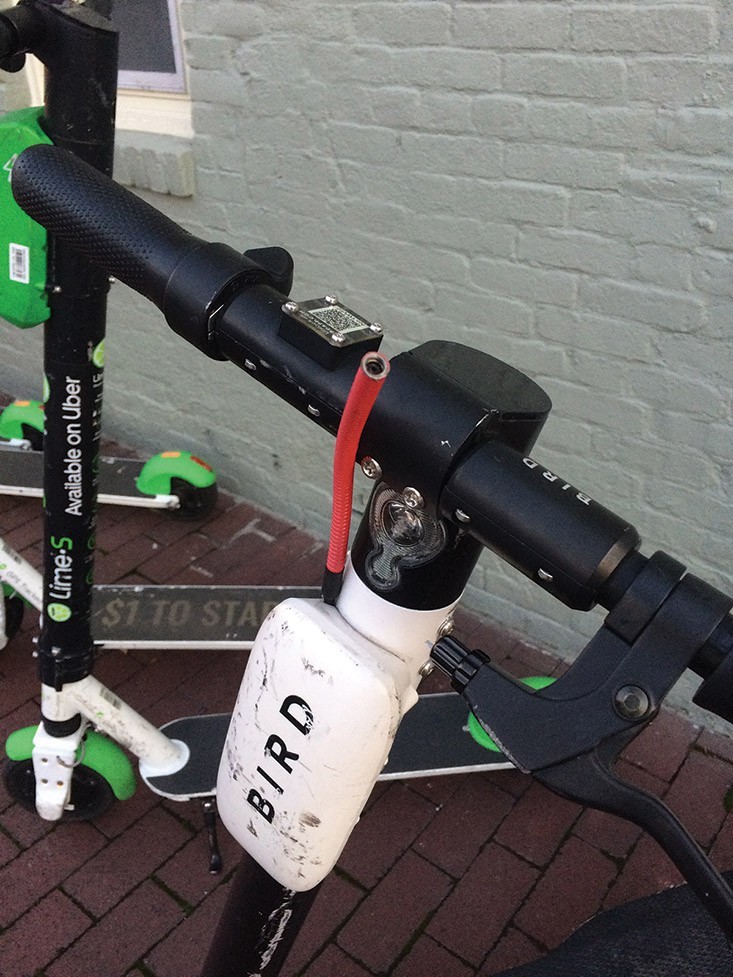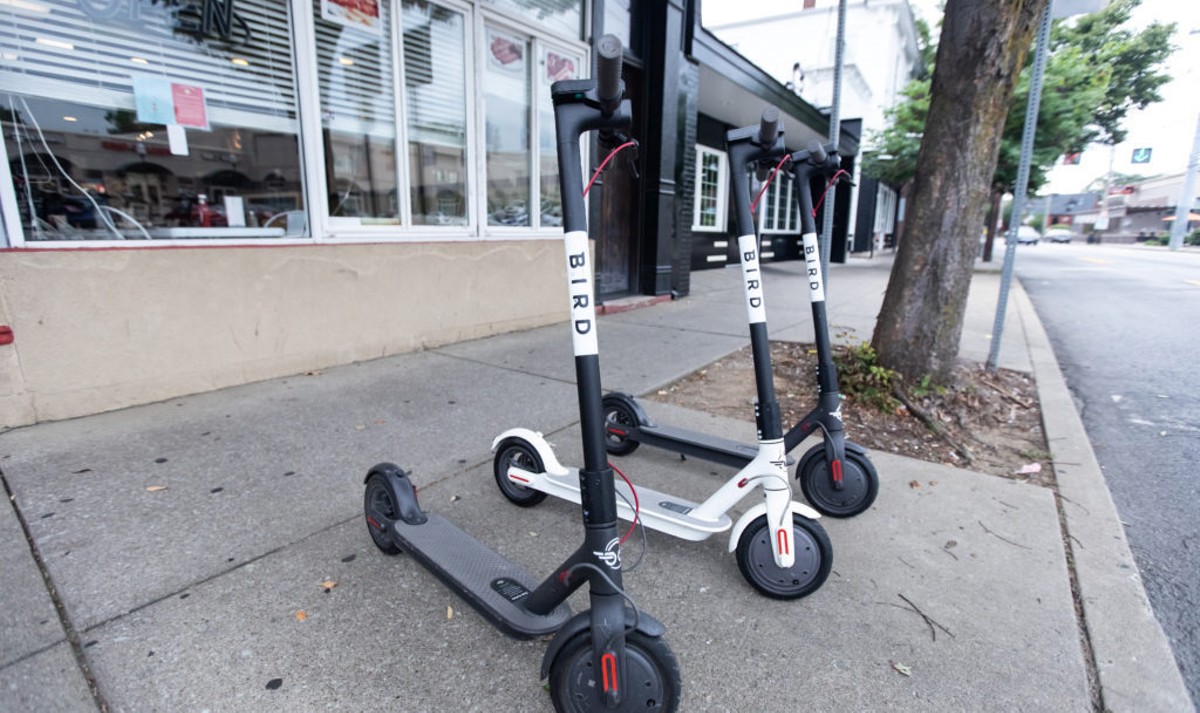Lime scooters has declared its first year in Louisville “mainly positive,” although the city and residents say it continues to be a bumpy road as they adjust to the growing presence of electric scooters.
More than 400,000 e-scooter rides have been taken in Louisville since the first company, Bird, launched operations in the city in August 2018 — around 250,000 of which have been taken on Lime e-scooters, according to the company, which is one of four operators in the city. And, Metro government says that the average ride distance of approximately 1.5 miles is evidence that many riders are using the e-scooters as an alternative to driving short distances.
But, e-scooters are being vandalized, suggesting that not everyone values the technology.
James Graham, the city’s mobility coordinator, said he has noticed “intermittent” bouts of damage to e-scooters since they came to Louisville. Recently, he discovered a pile of 15 or so e-scooters, all with their brakes cut, dumped on Washington Street. Lime reported a case to LMPD of one of their e-scooters being thrown into the river, which was filmed and posted to the social media app TikTok. Both Lime and Bird have experienced several cases of vandalism since debuting in Louisville.
Despite this, Adam Bolin, Lime’s operations manager for Kentucky, said the company’s first year in Louisville has been “mainly positive.”
“You’re going to have resistance to any change,” he said. “That’s a natural reaction for people.”
Out of the e-scooter companies operating in Louisville, only Lime talked to LEO, although Bird and another company, Bolt, submitted statements. Bird has condemned vandalism and asked citizens of Louisville to report incidences.
The city has increased the number of permits available to e-scooter companies to eight from four, said Graham.
Lime was the second to come to Louisville, three months after Bird. Bolt came in July 2019, with Spin following a month later. Another company, HOPR, is on deck to deploy 20 so-called “dockless vehicles” soon, Graham said.
In addition to the average trip distance, another good sign for e-scooter operations in Louisville is that 47% of Lime’s users have been riding the e-scooters through the city during “peak commuter times,” the company says — a sign that they say points to riders using the e-scooters as an everyday mode of transportation.
Graham also suspects that this might be the case. “One of the complaints we have is that people are just using them recreationally, but I think that the average trip distance really suggests otherwise,” he said.
Luigi Gelsomini, owner of Luigi’s Pizzeria in downtown Louisville, thinks that the e-scooters are a good alternative to traditional modes of transportation.
“It’s clean,” he said. “It’s good for the environment.”

But not everyone sees the e-scooters as an enhancement to their city.
A social media account, Bird Graveyard, posts videos from around the world of people damaging e-scooters in all sorts of ways: burying them, stuffing them into toilets and using them as burning pyres for skating tricks. Some of the posts and comments from the account have an anti-corporation bent. News outlets like The Guardian and the Los Angeles Times have attributed the vandalism of e-scooters to a frustration with tech companies invading public spaces without permission.
Lime and Bird removed several e-scooters from the street in August after discovering that brake lines had been cut. That was the worst bout of vandalism for Lime, said Bolin, and since then, the company has received reports of damaged e-scooters only sporadically.
Recently, Lime removed another “handful” of damaged e-scooters from the streets. Lime reports all of these incidents to the police.
Graham and Bolin said that they don’t know the vandals’ motivation, but Bolin added that with anything new, there are going to be detractors, some of whom might take their frustrations out by damaging property.
Aaron Givhan, president of Louisville’s Highland Commerce Guild, hasn’t noticed e-scooter vandalism in Louisville, but he has his own thoughts about the vehicles. He likes that they provide a low-pollution transportation option and that riders use them to reach local businesses, but he isn’t sold on them.
“The biggest thing about that mode of transportation is no helmets, no training and no common sense,” he said.
E-scooters aren’t allowed on the sidewalks in Louisville, but Givhan has still been startled by riders silently zooming up behind him while he’s been out walking. He’s also seen riders going the wrong way down one-way streets.
Bringing e-scooters to cities across the country has been more complicated than anyone, the companies or the cities, originally expected, said Bolin. The big question has been: How do you fit a new mobility option into an infrastructure that wasn’t built for it?
For example, sidewalks are not good places to use e-scooters, but streets can be dangerous for them. “So, we’re finding different cities are adding more infrastructure, protected bike lanes,” said Bolin.
In Louisville, city ordinances prohibit e-scooters from operating in bike lanes, but, as previously mentioned, they’re also not allowed on sidewalks, said Graham. He wants to amend the city law.
In August, Louisville set speed restrictions and no-ride and no-parking zones in some areas. With geofencing technology, e-scooters automatically slow to 10 mph in the Central Business District, Waterfront Park, UofL, the KFC Yum Center pavilion and the Mid City Mall. They stop working entirely near the Kentucky School for the Blind and American Printing House for the Blind, the downtown skatepark and the Kentucky Exposition Center, which also are no parking zones. The Big Four Bridge is intended to be a no-ride zone, but e-scooter companies have managed to only slow them in that area, said Graham.
The city now bans e-scooter use from 9 p.m. to 6 a.m., because most accidents in other cities that Louisville researched occurred after dark. (So far, no one has died while riding an e-scooter in Louisville, although it has happened in other areas, including Lexington, Kentucky). Metro government may move up the nighttime ban to an earlier time as the sun begins to set earlier.
Since instituting these rules, Graham said, complaints about e-scooters have gone down. He did not provide a number.
The number of concerns submitted to Metro311 and obtained by LEO in a public records requests, have remained fairly consistent: From January to October of this year, 12 complaints were made about e-scooters to Metro311. Four have been logged since August.
All mention e-scooters needing to be moved.
“Hello. What can be done with these electric scooters left blocking the sidewalks?” read one.
One Main Street business owner has been seen wheeling e-scooters into an alley away from his business.
That’s a concern that hasn’t gone away with the new rules, said Graham.
“People do still complain that they’re kind of cluttering the sidewalk,” Graham said, “And in some cases they present a challenge for ADA compliance, where the sidewalks might not be wide enough to accommodate the e-scooters while keeping the sidewalk accessible.”
At the request of Councilman Brandon Coan, the city is working on addressing this issue with a pilot parking program in The Highlands. Metro government has identified nine spots where riders normally leave their e-scooters and where the city could paint parking zones onto public rights of way away from the road.
Due to cold weather, this isn’t likely to happen until late winter or early spring, Graham said.
Lime has been involved with most of the e-scooter rules that the city has implemented. The parking issue is no different, but Bolin isn’t sure that the company will be able to comply with everything the city is interested in doing.
Louisville Metro would like for the e-scooter companies to provide monetary incentives to riders for parking their e-scooters in designated zones. Lime isn’t interested in carrying the entirety of the financial burden, said Bolin, but he’s seen another solution in other cities where local governments have helped to subsidize rides for people who park their e-scooters.
“[We] try to be a strategic partner,” Bolin said.
Even as the colder months begin, and ridership is expected to decrease, e-scooter companies continue to invest in Louisville. Lime and Bird were recently approved to increase their e-scooter fleets to 450 from 250, although Lime said that it might hold off on until winter ends.
How To Report Vandalism
Lime and Bird both encourage Louisville residents to report vandalism of their e-scooters on their mobile apps. Bird can also be reached at [email protected], and Lime has an operations team that “constantly” checks its e-scooters, running a full diagnostic test on every one that is encountered. Lime says that e-scooters are immediately removed from the streets once reported as damaged. Bolt has a 24-hour hotline to report issues to: (866) 2658-143. •






